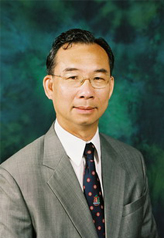
For more information email:
aiperth2011{at}gmail.com
Keynote Speakers

Information Granularity and Granular Architectures of Computational Intelligence
Information granules regarded as conceptually justifiable constructs constitute building blocks of intelligent systems. As such, information granules are used in various pursuits of system analysis and design. Computational Intelligence (CI) being commonly viewed as a highly synergistic framework of neurocomputing, fuzzy sets, and evolutionary optimization benefits immensely from the concept of information granularity. The idea of granular constructs of CI brings forward an essential generalization of such fundamental architectures as neural networks or fuzzy models (classifiers, predictors, etc.) that result in granular neural networks or granular fuzzy models.
We discuss the conceptual and algorithmic underpinnings of information granulation, information granulation, and computing with information granules. A particular emphasis is placed on the diversity of formal means behind the representation of information granules and various ways of their construction. With respect to the latter presented are main ways of the formation of information granules including a principle of justifiable granularity.
Information granulation becomes beneficial to the processes of knowledge management in a multimodel CI environment (say, multi-agent systems) by facilitating the realization of knowledge sharing, reconciliation, consensus building, and knowledge transfer. The main schemes behind the emergence of information granules are elaborated on. It is shown that information granularity emerges as an immediate and inevitable consequence of the existing diversity of sources of knowledge (models) involved in the overall process of knowledge management. The granularity of the resulting construct is essential to the description and quantification of diversity and coherence of the available sources of knowledge. Information granularity furnishes a very much-needed level of flexibility that becomes crucial to facilitate interaction. We discuss a general design strategy present in knowledge management in the CI setting, whose essence dwells upon on the concept of an optimal allocation of information granularity. A number of examples of granular constructs formed with regard to neural networks, namely granular neural networks, are discussed in detail.
Witold Pedrycz (M’88, SM’90, F’99) is a Professor and Canada Research Chair (CRC - Computational Intelligence) in the Department of Electrical and Computer Engineering, University of Alberta, Edmonton, Canada. He is also with the Systems Research Institute of the Polish Academy of Sciences, Warsaw, Poland. He also holds an appointment of special professorship in the School of Computer Science, University of Nottingham, UK. In 2009 Dr. Pedrycz was elected a foreign member of the Polish Academy of Sciences. He main research directions involve Computational Intelligence, fuzzy modeling and Granular Computing, knowledge discovery and data mining, fuzzy control, pattern recognition, knowledge-based neural networks, relational computing, and Software Engineering. He has published numerous papers in this area. He is also an author of 14 research monographs covering various aspects of Computational Intelligence and Software Engineering. Witold Pedrycz has been a member of numerous program committees of IEEE conferences in the area of fuzzy sets and neurocomputing. Dr. Pedrycz is intensively involved in editorial activities. He is an Editor-in-Chief of Information Sciences and Editor-in-Chief of IEEE Transactions on Systems, Man, and Cybernetics - part A. He currently serves as an Associate Editor of IEEE Transactions on Fuzzy Systems and is a member of a number of editorial boards of other international journals. He has edited a number of volumes; the most recent one is entitled “Handbook of Granular Computing” (J. Wiley, 2008). In 2007 he received a prestigious Norbert Wiener award from the IEEE Systems, Man, and Cybernetics Council. He is a recipient of the IEEE Canada Computer Engineering Medal 2008. In 2009 he has received a Cajastur Prize for Soft Computing from the European Centre for Soft Computing for “pioneering and multifaceted contributions to Granular Computing”.

Applications of Evolutionary Optimisation in Modern Power Systems
Modern power systems are complex and are complicated to operate or to plan because of the advent of new power devices, new generation sources, network interconnection and, in some countries, the competitive environment in which the power system is operated. For reliable supply and transmission of electric power, there are many decision problems which involve the use of optimization techniques. Owing to the complexity and non- linearity of power systems, conventional optimization techniques may only obtain local optimal solutions or unable to provide acceptable solutions to the problems. The research of computational intelligence techniques in the last fifteen years by researchers has shown that evolutionary computation techniques are promising methods to deal with difficult power system optimization problems. The talks will present some of the advances in the applications of evolutionary optimization in power system analysis, power market analysis, and power system operation and planning.
Kit Po WONG obtained M.Sc and Ph.D. degrees from the University of Manchester, UK in 1972 and 1974, respectively. Prof. Wong was awarded a higher doctorate DEng degree by the University of Manchester, Institute of Science and Technology (UMIST) in 2001. Prof. Wong is a Chair Professor of the Department of Electrical Engineering, Hong Kong Polytechnic University. He was formerly a Professor at the University of Western Australia, where he is currently an Adjunct Professor. He had served as a Guest Professor of Tsinghua University, Beijing, China and is presently a Guest Professor at Southeast University, Nanjing, China.. He received three Sir John Madsen Medals (1981, 1982 and 1988) from the Institute of Engineers Australia, the 1999 Outstanding Engineer Award from the IEEE Power Chapter Western Australia and the 2000 IEEE Third Millennium Award. Professor Wong has published numerous research papers in power systems and on computational intelligence in power systems. Professor Wong served as Editor in Chief for IEE Proceedings Generation, Transmission and Distribution. He is now serving as Editor in Chief for IEEE PES Letters. Professor Wong was the Conference Chair of IEEE/CSEE PowerCon2000, IEE APSCOM 2003 and IET APSCOM 2009. He is a Fellow of IEEE, IET, HKIE and IEAust.
Associate Professor Kay Chen Tan

Evolutionary Multi-objective Algorithms for Practical Problem-Solving
Multi-objective evolutionary algorithms are a class of stochastic optimization techniques that simulate biological evolution to solve problems with multiple (and often conflicting) objectives. Advances made in the field of evolutionary multi-objective optimization (EMO) are the results of more than two decades of research, studying various topics that are unique to MO problems, such as fitness assignment, diversity preservation, balance between exploration and exploitation, elitism and archiving. However many of these studies assume that the problem is deterministic, while the EMO performance generally deteriorates in the presence of uncertainties. The seminar will first provide an overview of evolutionary computation and its application to multi-objective optimization. It then discusses challenges faced in EMO research and presents various EMO features and algorithms for good optimization performance. Specifically, the impact of uncertainties will be described and the enhancements to EMO algorithmic design for robust optimization will be presented. The seminar will also discuss the application of EMO techniques for solving practical problems that involve multiple competing specifications in a large and constrained search space.
Kay Chen TAN is currently an Associate Professor at the Department of Electrical and Computer Engineering, National University of Singapore. He is actively pursuing research in computational and artificial intelligence, with applications to multi-objective optimization, scheduling, automation, data mining, and games.
Dr Tan has published over 100 journal papers, over 100 papers in conference proceedings, co-authored 5 books including Multiobjective Evolutionary Algorithms and Applications (Springer-Verlag, 2005), Modern Industrial Automation Software Design (John Wiley, 2006; Chinese Edition, 2008), Evolutionary Robotics: From Algorithms to Implementations (World Scientific, 2006; Review), Neural Networks: Computational Models and Applications (Springer-Verlag, 2007), and Evolutionary Multi-objective Optimization in Uncertain Environments: Issues and Algorithms (Springer-Verlag, 2009), co-edited 4 books including Recent Advances in Simulated Evolution and Learning (World Scientific, 2004), Evolutionary Scheduling (Springer-Verlag, 2007), Multiobjective Memetic Algorithms (Springer-Verlag, 2009), and Design and Control of Intelligent Robotic Systems (Springer-Verlag, 2009).
Dr Tan has been invited to be a keynote/invited speaker for 21 international conferences. He served in the international program committee for over 100 conferences and involved in the organizing committee for over 30 international conferences, including the General Co-Chair for IEEE Congress on Evolutionary Computation 2007 in Singapore and the General Co-Chair for IEEE Symposium on Computational Intelligence in Scheduling 2009 in Tennessee, USA. Dr Tan is currently a Distinguished Lecturer of IEEE Computational Intelligence Society.
Dr Tan is currently the Editor-in-Chief of IEEE Computational Intelligence Magazine (CIM). He also serves as an Associate Editor / Editorial Board member of over 15 international journals, such as IEEE Transactions on Evolutionary Computation, IEEE Transactions on Computational Intelligence and AI in Games, Evolutionary Computation (MIT Press), European Journal of Operational Research, Journal of Scheduling, and International Journal of Systems Science.
Dr Tan is the awardee of the 2012 IEEE Computational Intelligence Society (CIS) Outstanding Early Career Award for his contributions to evolutionary computation in multi-objective optimization. He also received the Recognition Award (2008) from the International Network for Engineering Education & Research (iNEER) for his outstanding contributions to engineering education and research. He was also a winner of the NUS Outstanding Educator Awards (2004), the Engineering Educator Awards (2002, 2003, 2005), the Annual Teaching Excellence Awards (2002, 2003, 2004, 2005, 2006), and the Honour Roll Awards (2007). Dr Tan is currently a Fellow of the NUS Teaching Academic.